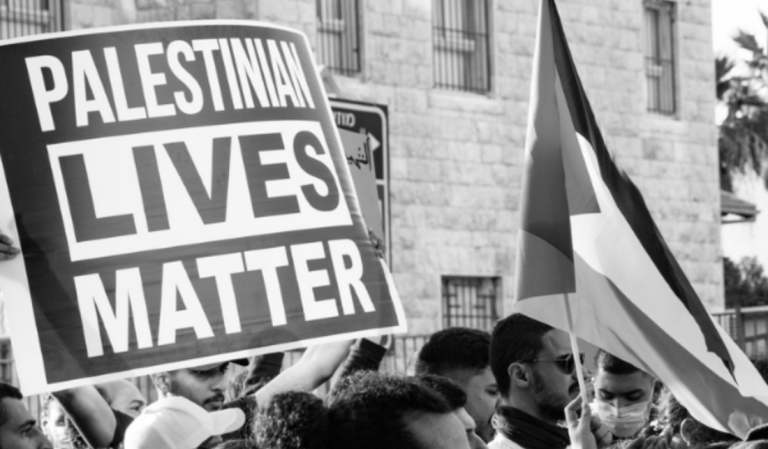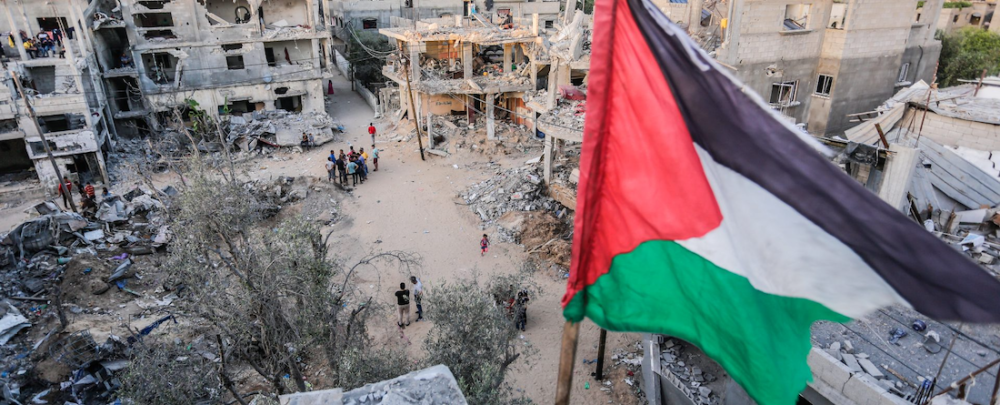
New York, N.Y. — As Israel’s military campaign in Gaza, supported by U.S. backing, continues to devastate the region, a parallel issue is gaining attention: anti-Palestinian racism.
This form of discrimination, as outlined by Jewish Voice for Peace and Visualizing Palestine, manifests in silencing, excluding, erasing, stereotyping, dehumanizing, or defaming Palestinians, those perceived as Palestinian, or anyone advocating for Palestinian freedom. The framework provided by Visualizing Palestine offers a lens to understand this distinct racism and its role in perpetuating oppression.

Anti-Palestinian racism operates on multiple levels.
It dehumanizes Palestinians by portraying them as threats or lesser beings, often through media stereotypes or political rhetoric. This dehumanization justifies violence and marginalization, making it easier to dismiss Palestinian suffering.
For example, Palestinians in Gaza, enduring relentless bombardment, are often reduced to numbers or labeled as collateral damage, stripping away their humanity and individual stories.
Erasure is another critical aspect.
Palestinian narratives—histories, cultures, and lived experiences—are systematically sidelined or distorted. This occurs in academic settings, media coverage, and political discourse, where Palestinian perspectives are underrepresented or dismissed as biased. Such erasure not only undermines Palestinian identity but also weakens global understanding of their struggle for self-determination and justice.
Repression of dissent is equally pervasive.
Individuals and groups expressing solidarity with Palestinians often face severe backlash, including accusations of anti-Semitism, professional consequences, or social ostracism. This tactic stifles free speech and discourages advocacy for Palestinian rights. Jewish Voice for Peace, a U.S.-based organization advocating for Palestinian liberation, has emphasized how this repression targets not only Palestinians but also Jews and others who challenge Israeli policies.
The current Gaza conflict amplifies these issues.
Since October 2023, Israel’s military operations have resulted in tens of thousands of Palestinian deaths and widespread destruction, according to international reports.
Amid this humanitarian crisis, anti-Palestinian racism has intensified, with global protests met by counter-narratives that vilify Palestinian resistance or equate criticism of Israel with hatred. Visualizing Palestine’s visual framework underscores how such racism fuels the cycle of violence and oppression.
This racism is not confined to Israel or Gaza.
In Western countries, Palestinians and their supporters face discrimination in workplaces, schools, and public spaces. For instance, Palestinian students in U.S. universities have reported harassment for expressing their views, while advocacy groups face legal challenges for organizing protests.
These incidents reflect a broader pattern of exclusion and silencing that mirrors the experiences of other marginalized groups but remains distinct in its targeting of Palestinian identity and solidarity.
Addressing anti-Palestinian racism requires acknowledging its specificity. Unlike generic xenophobia, it is rooted in the political and historical context of Israel’s occupation and the Palestinian struggle for freedom. Visualizing Palestine’s framework calls for dismantling stereotypes, amplifying Palestinian voices, and protecting the right to dissent. This involves challenging biased media portrayals, supporting Palestinian-led initiatives, and fostering dialogue that centers Palestinian experiences.
International organizations have begun to take notice.
Human rights groups like Amnesty International and Human Rights Watch have documented how discriminatory practices against Palestinians extend beyond physical violence to systemic erasure and repression. Yet, global responses remain inconsistent, with powerful nations often shielding Israel from accountability, which emboldens anti-Palestinian narratives.
Jewish Voice for Peace emphasizes solidarity as a counterforce.
By aligning with Palestinian activists, they reject the notion that criticism of Israel equates to anti-Semitism, instead framing it as a call for justice. Their collaboration with Visualizing Palestine highlights the power of visual storytelling in exposing racism and fostering empathy. These efforts aim to shift public perception and encourage collective action.
As the Gaza crisis persists, the fight against anti-Palestinian racism grows urgent.
It demands global awareness, institutional reform, and grassroots advocacy to dismantle the structures that perpetuate this discrimination. By recognizing and addressing anti-Palestinian racism, the international community can take a step toward justice, ensuring that Palestinian voices are heard, their narratives honored, and their rights upheld.
#AntiPalestinianRacism #PalestinianRights
#GazaGenocide #HumanRights #JusticeForPalestine
Tags: Anti-Palestinian Racism, Gaza Conflict,
Palestinian Rights, Israeli Oppression, Human Rights
